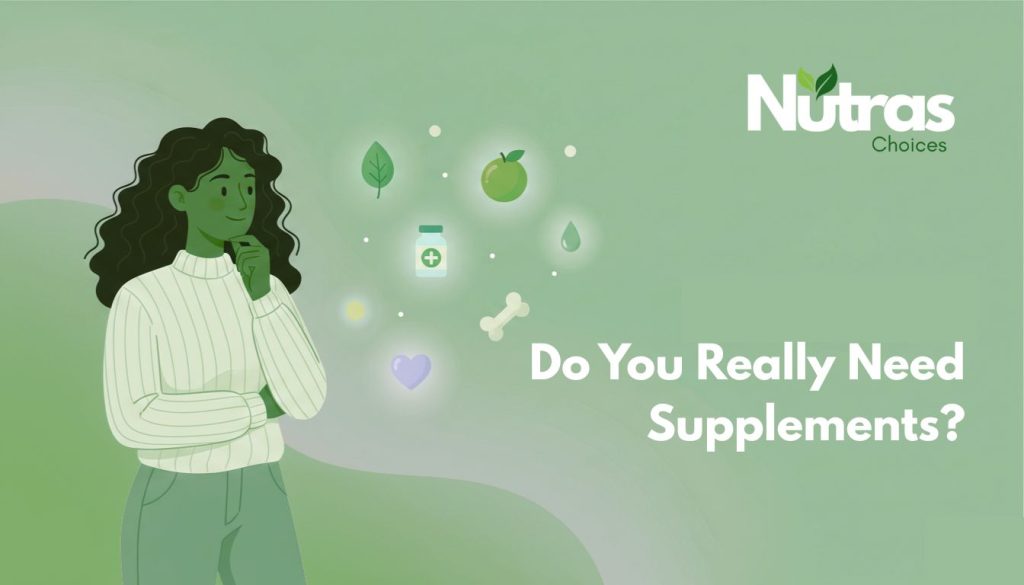Walk down any pharmacy aisle and you’ll see shelves packed with colorful bottles promising everything from better energy to glowing skin. It’s no wonder so many of us feel overwhelmed trying to figure out if we actually need supplements or if we’re just falling for clever marketing. At Nutras Choices, we help women understand whether they truly need supplements and how to make safe, informed decisions. If you’re asking yourself Do You Really Need Supplements, you’re not alone.
The truth is, most of us can get what we need from a balanced diet. But life isn’t always that simple. Between busy schedules, food preferences, life stages, and individual health needs, sometimes our bodies do need a little extra support. The key is knowing when that’s actually the case – and how to make safe, informed choices when it is.
Let’s cut through the confusion and help you figure out what your body might really be missing.
Introduction – why understanding nutrient gaps matters now
Here’s something that might surprise you: despite having access to more food variety than ever before, many American women still experience body nutrient gaps women that affect their overall health. According to the Office on Women’s Health, women are commonly low in iron, calcium, vitamin D, and folate – nutrients that play crucial roles in everything from bone health to energy levels.
If you’re wondering Do You Really Need Supplements, it’s worth understanding that more isn’t always better. Some nutrients can actually be harmful in large amounts, and others work best when they come from food sources. The goal isn’t to take as many supplements as possible – it’s to identify genuine gaps and address them thoughtfully.
This matters more now because our modern lifestyles often make it harder to get consistent nutrition. We’re busier, we eat more processed foods, and many of us spend less time in the sun (hello, vitamin D deficiency). Add in factors like hormonal birth control, certain medications, or life stages like pregnancy or menopause, and it becomes clear why some women might benefit from targeted supplementation.

Signs you might be missing something from food first
Your body is pretty good at sending signals when something’s off. The trick is learning to recognize these signs and understanding what they might mean. According to nutrition experts at EatingWell, here are some common warning signs that you might have a nutrient deficiency:
Energy and mood changes:
- Persistent fatigue that doesn’t improve with rest
- Feeling unusually irritable or anxious
- Difficulty concentrating or brain fog
- Mood swings that seem out of character
Physical symptoms:
- Hair that’s thinning, brittle, or losing its shine
- Nails that break easily or have ridges
- Skin that’s unusually dry, pale, or slow to heal
- Frequent muscle cramps or weakness
Sleep and appetite issues:
- Trouble falling asleep or staying asleep
- Unusual food cravings, especially for ice or starch
- Loss of appetite or changes in taste
Immune system signals:
- Getting sick more often than usual
- Cuts and bruises that heal slowly
- Frequent infections
Keep in mind that these symptoms can have many causes, and they don’t automatically mean you need supplements. Stress, lack of sleep, underlying health conditions, or even certain medications can cause similar issues. That’s why it’s important to look at the bigger picture of your health and diet.
When supplements may make sense – what to look for
So when might supplements actually be worth considering? The NIH Office of Dietary Supplements suggests that supplements can be helpful in specific situations where it’s difficult to get enough nutrients from food alone.
Common scenarios where supplements may help:
- Restrictive diets: If you’re vegetarian, vegan, or have food allergies that limit your options
- Life stages: Pregnancy, breastfeeding, or menopause when nutrient needs change
- Medical conditions: Digestive issues that affect nutrient absorption, or conditions that increase nutrient needs
- Medications: Some prescriptions can interfere with nutrient absorption or increase your body’s needs
- Limited sun exposure: If you work indoors and live in northern climates, vitamin D supplements may be beneficial
Red flags that supplements probably aren’t the answer:
- You’re hoping they’ll make up for a consistently poor diet
- You’re taking them “just in case” without any specific reason
- You’re expecting dramatic changes in energy or appearance
- You’re using them to replace medical treatment for a health condition
The most helpful approach is to start by honestly evaluating your current diet. Are you eating a variety of fruits and vegetables? Getting enough protein? Including whole grains and healthy fats? If your diet is already pretty balanced, you may not need much – if any – supplementation.
How to evaluate supplement safety and quality
If you do decide to try supplements, quality and safety should be your top priorities. Unlike prescription medications, supplements aren’t strictly regulated by the FDA before they hit the market. This means the responsibility falls on you to choose wisely.
Here’s what to look for:
Third-party testing: Look for seals from organizations like USP, NSF International, or ConsumerLab. These groups test supplements to verify that they contain what the label claims and check for harmful contaminants.
Clear ingredient amounts: The label should list exactly how much of each ingredient is included. Avoid products with “proprietary blends” that don’t specify individual amounts.
Expiration dates: Like food, supplements can lose potency over time. Check dates and store them properly.
Allergen labeling: If you have food allergies, make sure the label clearly states whether the product contains common allergens like soy, dairy, or gluten.
Manufacturer transparency: Reputable companies provide contact information, manufacturing details, and are responsive to customer questions.
Red flags to avoid:
- Claims that sound too good to be true (like “miracle cure” or “instant results”)
- Products marketed as “natural” with no other safety information (natural doesn’t automatically mean safe)
- Supplements sold only through multi-level marketing or with high-pressure sales tactics
For more detailed safety information, the FDA’s guide to dietary supplements provides helpful consumer resources.
When to see your clinician before starting a supplement
Consider scheduling an appointment if you: have chronic health conditions, take prescription medications, are pregnant or planning to become pregnant, have a history of kidney stones or liver problems, or are considering high-dose supplements. Your healthcare provider can help you avoid potentially dangerous interactions and ensure supplements are appropriate for your situation.

Dosage & interactions: rules to follow
Getting the dosage right is crucial – and it’s not always a case of “more is better.” Some nutrients can actually be harmful in large amounts, while others work best when taken in specific ways.
Fat-soluble vitamins (A, D, E, K) deserve special caution. Unlike water-soluble vitamins that your body can easily eliminate, fat-soluble vitamins are stored in your body’s fat tissues. This means they can build up to toxic levels if you take too much over time.
Prescription medication interactions are real and can be serious. For example, if you take blood thinners like warfarin, vitamin K supplements can interfere with the medication’s effectiveness. Calcium can reduce the absorption of certain antibiotics, while iron supplements can interfere with thyroid medications.
Blood tests can provide valuable guidance, especially before starting high-dose supplements. Tests can show whether you actually have a deficiency and help your healthcare provider recommend appropriate dosages. This is particularly important for nutrients like vitamin D, B12, and iron, where too much can cause problems.
General dosage guidelines:
- Start with the lowest effective dose
- Follow package directions unless advised otherwise by a healthcare provider
- Take supplements with food when recommended to improve absorption and reduce stomach upset
- Space out different supplements throughout the day when possible
- Keep a record of what you’re taking and any effects you notice
If you’re interested in learning more about how supplements might affect your sleep patterns, check out our guide on Sleep & Supplements.
Life stage & special situations
Women’s nutritional needs change throughout life, and certain situations may increase the likelihood that supplements could be helpful.
Pregnancy and family planning
If you’re trying to conceive or are already pregnant, folate (or folic acid) supplementation is commonly recommended to help prevent birth defects. Many prenatal vitamins also include iron, calcium, and DHA. However, pregnancy is definitely a time to work closely with your healthcare provider – some supplements that are fine normally can be harmful during pregnancy.
Breastfeeding
Nursing mothers often have increased nutritional needs, and some nutrients like vitamin D may not transfer well through breast milk. Your doctor may recommend continuing prenatal vitamins or specific supplements based on your diet and health status.
Contraception and hormonal medications
Hormonal birth control can affect how your body processes certain nutrients. Some women on hormonal contraception may have lower levels of certain B vitamins, magnesium, or zinc. If you’re experiencing symptoms like fatigue or mood changes, it’s worth discussing with your healthcare provider.
Perimenopause and menopause
Hormonal changes during this life stage can affect bone density, sleep, and overall well-being. Some women find that calcium, vitamin D, or magnesium glycinate supplements help with symptoms, but individual needs vary significantly.
Vegetarian and vegan diets
Plant-based diets can be incredibly healthy, but they may require attention to certain nutrients that are primarily found in animal products. Vitamin B12, iron, zinc, and omega-3 fatty acids are commonly recommended supplements for people following vegetarian or vegan diets.
Chronic health conditions
Conditions like thyroid disease, autoimmune disorders, digestive issues, or diabetes can all affect nutritional needs. If you have a chronic condition, it’s especially important to work with your healthcare team before adding supplements, as they may interact with medications or affect your condition.
For more information about multivitamins specifically designed for women’s needs, you might find our Women’s Multivitamins guide helpful.
Practical checklist for your next step
Ready to evaluate whether supplements might be right for you? Here’s a practical checklist you can use to guide your decision-making:
Your Supplement Decision Checklist:
- □ Review your current diet honestly – are you eating a variety of nutrient-rich foods most days?
- □ List any persistent symptoms you’ve been experiencing (fatigue, hair changes, sleep issues, etc.)
- □ Note your life stage and any special circumstances (pregnancy, menopause, dietary restrictions)
- □ Write down all medications and supplements you currently take
- □ Consider whether you have risk factors for specific deficiencies (limited sun exposure, heavy periods, etc.)
- □ Identify 2-3 specific health goals you’re hoping to address
- □ Schedule a check-in with your healthcare provider if you have questions or concerns
- □ Research any supplements you’re considering using reputable sources
Download our one-page Supplement Safety Checklist for a printable version you can take to your next doctor’s appointment.
Conclusion
The bottom line? Most women can get the nutrients they need from a balanced diet, but there are legitimate situations where supplements can be helpful. The key is being thoughtful about it rather than taking a “more is better” approach.
Your next steps:
- Take an honest look at your current diet – keep a food diary for a few days to see where you might have gaps
- Make a list of all medications and supplements you currently take – this will be helpful when talking to your healthcare provider
- Schedule a check-in with your doctor or a registered dietitian – especially if you’re experiencing persistent symptoms or considering major changes to your supplement routine
Remember, supplements are meant to supplement a healthy lifestyle, not replace it. Focus on eating well, getting enough sleep, managing stress, and staying active. These fundamentals will do more for your health than any pill.
This post is informational only and not medical advice. Consult a healthcare professional before starting supplements.
Frequently Asked Questions
Q: Can I take too many vitamins?
A: Yes, especially fat-soluble vitamins (A, D, E, K) that your body stores. Taking more than recommended amounts can lead to toxicity symptoms. Always follow dosage instructions and consult a healthcare provider for high-dose supplements.
Q: Are expensive supplements always better quality?
A: Not necessarily. Price doesn’t guarantee quality. Look for third-party testing certifications, clear labeling, and reputable manufacturers rather than focusing solely on cost.
Q: How long should I take supplements before expecting to see results?
A: It varies by nutrient and individual, but most experts suggest giving supplements 8-12 weeks to show effects. Some nutrients like iron may take longer to correct deficiencies.
Q: Can supplements replace a healthy diet?
A: No. Supplements work best alongside a balanced diet rich in whole foods. They’re meant to fill specific gaps, not replace the complex nutrition that comes from varied, nutrient-dense foods.
Q: Are gummy vitamins as effective as pills?
A: Gummy vitamins can be effective but often contain less of the active ingredients and more sugar. They’re also more likely to degrade over time. Pills or capsules are generally more reliable.
Q: Should I take supplements with or without food?
A: It depends on the supplement. Fat-soluble vitamins (A, D, E, K) are better absorbed with food containing fat. Some minerals like iron absorb better on an empty stomach but may cause nausea. Check the label for specific instructions.
Q: How do I know if my supplements are working?
A: Keep track of the symptoms or concerns that led you to try supplements. Some effects may be subtle and take time. For certain nutrients like vitamin D or B12, blood tests can objectively measure improvement.

